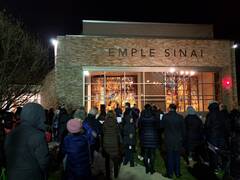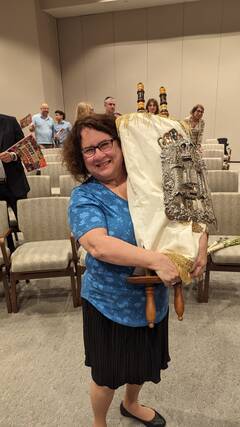Celebrate With Us!



Sukkot
Sukkot, a Hebrew word meaning "booths" or "huts," refers to the Jewish festival of giving thanks for the fall harvest, as well as the commemoration of the 40 years of Jewish wandering in the desert after Sinai. Sukkot is celebrated five days after Yom Kippur on the 15th of Tishrei and is marked by several distinct traditions. One tradition, which takes the commandment to "dwell in booths" literally, is to build a sukkah – a booth or hut. A sukkah is often erected by Jews during this festival, and it is common practice for some to eat and even live in these temporary dwellings during Sukkot.

Simchat Torah
Simchat Torah, Hebrew for "rejoicing in the Law," celebrates the completion of the annual reading of the Torah. It is a joyous festival when we affirm our view of the Torah as a tree of life and demonstrate a living example of never-ending, lifelong study. Torah scrolls are taken from the ark and carried or danced around the synagogue seven times. During the Torah service, the concluding section of Deuteronomy is read, and immediately following, the opening section of Genesis, or B'reishit as it is called in Hebrew, is read.
Chanukah
 Chanukah, meaning "dedication" in Hebrew, refers to the joyous eight-day celebration during which Jews commemorate the victory of the Macabees over the armies of Syria in 165 B.C.E., and the subsequent liberation and rededication of the Temple in Jerusalem. The modern home celebration of Chanukah centers around the lighting of the chanukiah – a special menorah for Chanukah, unique foods such as latkes and jelly doughnuts, and special songs and games.
Chanukah, meaning "dedication" in Hebrew, refers to the joyous eight-day celebration during which Jews commemorate the victory of the Macabees over the armies of Syria in 165 B.C.E., and the subsequent liberation and rededication of the Temple in Jerusalem. The modern home celebration of Chanukah centers around the lighting of the chanukiah – a special menorah for Chanukah, unique foods such as latkes and jelly doughnuts, and special songs and games.
Purim
Purim is celebrated by the reading of the Scroll of Esther, known in Hebrew as the Megillat Esther, which relates the basic story of Purim. Under the rule of King Ahashuerus, Haman – the King's prime minister – plots to exterminate all of the Jews of Persia. His plan is foiled by Queen Esther and her cousin Mordechai, who ultimately save the Jews of the land from destruction. The reading of the megillah is typically a rowdy affair, punctuated by booing and noise-making when Haman's name is read aloud.
Purim is an unusual holiday in many respects. First, Esther is the only Book of the Bible in which God is not mentioned. Second, Purim, like Chanukah, is viewed traditionally as a minor festival, but elevated to a major holiday as a result of the Jewish historical experience. Over the centuries, Haman became the embodiment of every anti-Semite in every land where Jews were oppressed. The significance in Purim lies not so much in how it began, but in what it has become – a thankful and joyous affirmation of Jewish survival against all odds.
Passover
Pesach, known as Passover in English, is a major Jewish spring festival commemorating the Exodus from Egypt over 3,000 years ago. The ritual observance of this holiday centers around a special home service called the seder (meaning "order") and a festive meal; the prohibition of chametz (leaven); and the eating of matzah (an unleavened bread). On the eve of the 15th day of Nisan in the Hebrew calendar, we read from a book called the hagaddah, meaning "telling," which contains the order of prayers, rituals, readings and songs for the Pesach seder. The Pesach seder is the only ritual meal in the Jewish calendar year for which such an order is prescribed, hence its name.
The seder has a number of scriptural bases. Exodus 12:3-11 describes the meal of lamb, unleavened bread and bitter herbs which the Israelites ate just prior to the Exodus. In addition, three separate passages in Exodus (12:26-7, 13:8, 13:14) and one in Deuteronomy (6:20-21) enunciate the duty of the parents to tell the story of the Exodus to their children. The seder plate contains various symbolic foods referred to in the seder itself.
Shavuot
Shavuot is a Hebrew word meaning "weeks" and refers to the Jewish festival marking the giving of the Torah at Mount Sinai. Shavuot, like so many other Jewish holidays, began as an ancient agricultural festival, marking the end of the spring barley harvest and the beginning of the summer wheat harvest. It was distinguished in ancient times by bringing crop offerings to the Temple in Jerusalem.
Also known as the Festival of the Giving of the Torah, Shavuot dates from biblical times, and helps to explain the holiday's name, "Weeks." The Torah tells us it took precisely 49 days for our ancestors to travel from Egypt to the foot of Mount Sinai – the same number of days as the Counting of the Omer, where they were to receive the Torah. Thus, Leviticus 23:21 commands: "And you shall proclaim that day (the 50th day) to be a holy convocation!" The name Shavuot or "Weeks" then symbolizes the completion of a seven-week journey.
Special customs on Shavuot include the reading of the Book of Ruth, which reminds us that we too can find a continual source of blessing in our tradition. Another includes staying up all night to study Torah and Mishnah, a custom called Tikkun Leil Shavuot, which symbolizes our commitment to the Torah, and that we are always ready and awake to receive the Torah. Traditionally, dairy dishes are served on this holiday to symbolize the sweetness of the Torah, as well as the land of milk and honey.



